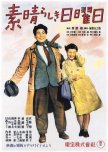Esta resenha pode conter spoilers
This is the kind of world where you need dreams the most, without them, it'd be too painful
One Wonderful Sunday was a combination of hope and despair, dreams and nightmares. The story followed two impoverished lovers in post-war Japan trying to stay together even though their financial situations were dire. Moments of happiness were quickly followed by the crushing blow of a sad reality.
Yuzo and Masako meet up on Sundays, their one free day of the week. One Sunday, between the two of them they had only 35 yen, a tiny amount even in 1947. Depressed Yuzo was ready to give up on their date day, but bubbly Masako refused to lose out on their time together and pushed him into a happier mood. There were moments of levity as Yuzo played baseball with street children, as the lovers tried to buy tickets to Schubert's "'Unfinished Symphony", and finally a cup of coffee on a rainy night. All ended in disaster. And yet each time they would bolster each other into a better mood, refusing to give up on their seemingly unattainable dreams.
Masako's effervescent mood could quickly turn into nearly hysterical tears. Yuzo could go from sounding suicidal to leaping into an imaginary world as a symphony conductor. Yuzo's poverty left him feeling emasculated as he often declared his inability to provide for and protect Masako made him feel less like a man. Numasaki Isao and Nakakita Chieko gave solid performances covering a wealth of human emotions.
Post war Tokyo with ruined buildings in the background, street children, rampant black market scams, and many English signs hinted at the drastic change and upheaval the citizens were living through.
The movie alternated between a desperate realism and sweet optimism. This 'day in a life movie' focused almost entirely on the two main characters and the actors carried the story forward with strong performances. The two characters, who were often one mishap away from disaster, fought to cling to each other and their dreams.
Ultimately, for me, One Wonderful Sunday's story felt like Schubert's "Unfinished Symphony", romantic and unfinished. The audience is left wondering what will become of Yuzo and Masako, and like the young lovers, hoping for their happy ending.
Yuzo and Masako meet up on Sundays, their one free day of the week. One Sunday, between the two of them they had only 35 yen, a tiny amount even in 1947. Depressed Yuzo was ready to give up on their date day, but bubbly Masako refused to lose out on their time together and pushed him into a happier mood. There were moments of levity as Yuzo played baseball with street children, as the lovers tried to buy tickets to Schubert's "'Unfinished Symphony", and finally a cup of coffee on a rainy night. All ended in disaster. And yet each time they would bolster each other into a better mood, refusing to give up on their seemingly unattainable dreams.
Masako's effervescent mood could quickly turn into nearly hysterical tears. Yuzo could go from sounding suicidal to leaping into an imaginary world as a symphony conductor. Yuzo's poverty left him feeling emasculated as he often declared his inability to provide for and protect Masako made him feel less like a man. Numasaki Isao and Nakakita Chieko gave solid performances covering a wealth of human emotions.
Post war Tokyo with ruined buildings in the background, street children, rampant black market scams, and many English signs hinted at the drastic change and upheaval the citizens were living through.
The movie alternated between a desperate realism and sweet optimism. This 'day in a life movie' focused almost entirely on the two main characters and the actors carried the story forward with strong performances. The two characters, who were often one mishap away from disaster, fought to cling to each other and their dreams.
Ultimately, for me, One Wonderful Sunday's story felt like Schubert's "Unfinished Symphony", romantic and unfinished. The audience is left wondering what will become of Yuzo and Masako, and like the young lovers, hoping for their happy ending.
Esta resenha foi útil para você?

 55
55 217
217 11
11























